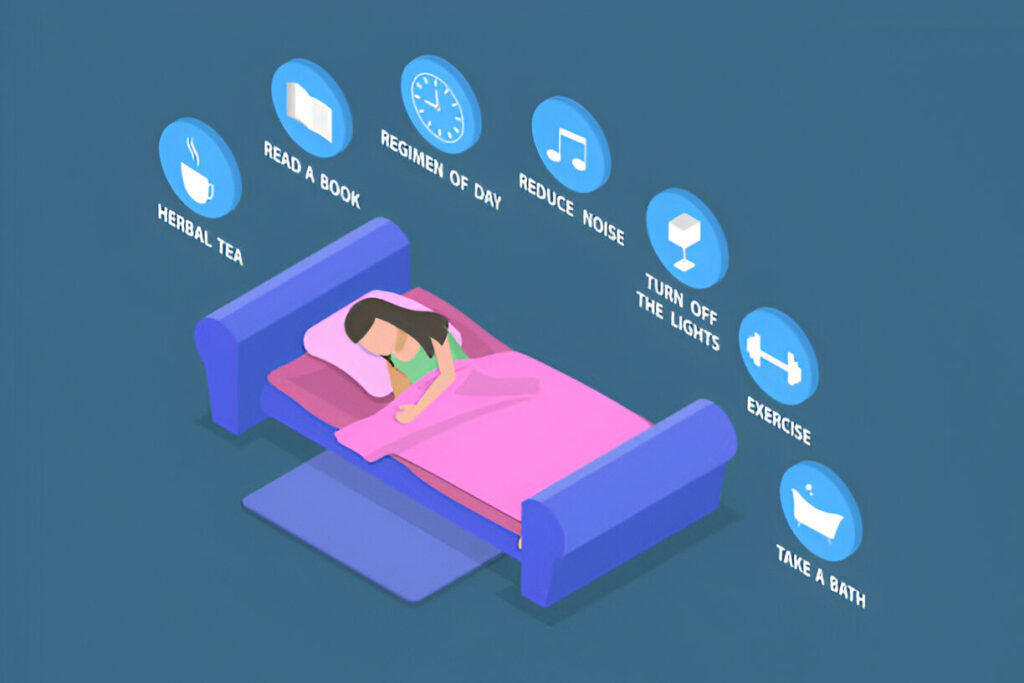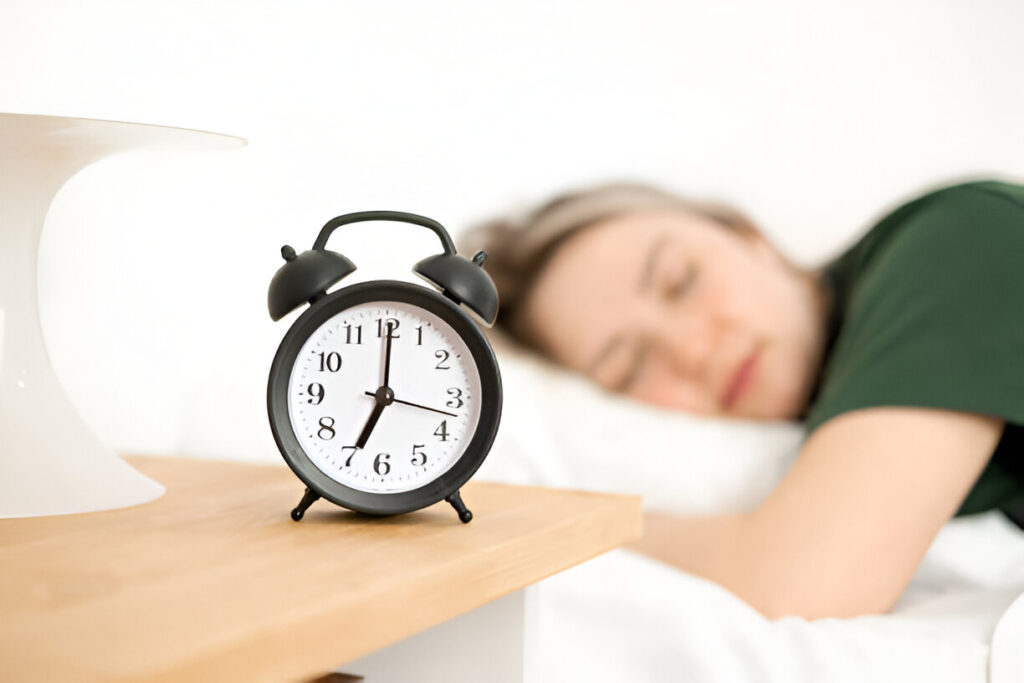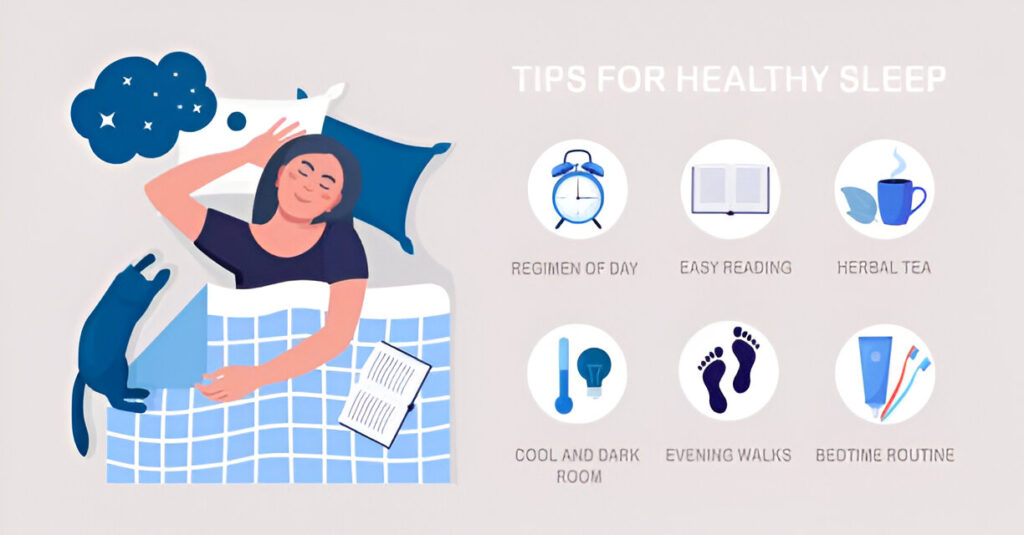Improve sleep habits and understanding cycles can lead to better rest and overall health. Sleep isn’t simply time spent in bed; it’s the quality of rest and how your body transitions through natural stages.
By refining habits and appreciating cycles, deeper, more restorative sleep can be unlocked. Establishing consistency is key; similar bed and wake times regulate the internal clock, facilitating falling asleep and waking refreshed.
A dark, quiet, cool room also promotes deep sleep by reducing stimuli and permitting restoration in cycle stages. Likewise, limit stimulants like caffeine, nicotine, and booze beforehand, as they can disrupt dropping off and cycles.

Relaxation methods, such as breathing, meditation, or muscle relaxation, can soothe the mind and prepare the body for sleep, resulting in more profound restoration during cycle stages.
Focusing on these approaches can help you develop better habits, assist in healthy cycles, and ultimately enhance your mental and physical wellness.
1. Routines are Important
Routines regulate the rhythm
Changing your sleep habits, understanding sleep cycles, and creating a consistent sleep schedule are some of your most powerful steps. Our bodies thrive on routine, and having a regular sleep-wake cycle helps synchronize your internal clock with the natural rhythms of the day.
Although establishing healthy habits may take effort, prioritizing a consistent schedule will support relaxation and recovery. Upon occasion, modifications may be helpful, but maintaining predictability is ideal. Sticking to set times for bed and waking can also help regulate hormones tied to your circadian rhythm.
This synchrony facilitates falling asleep quickly while also optimizing restoration overnight. Without a stable pattern, your sleep quality may deteriorate, leaving you feeling drained, on edge, and disconnected from your circadian clock’s directives.
Why It Works
- Keeping a consistent sleep schedule aids in aligning your body’s intrinsic circadian rhythm, the internal timekeeper that governs sleep cycles.
- When this internal process corresponds accurately to daily rhythms, you’ll naturally experience heightened alertness throughout daylight and drowsiness at nightfall.
- However, disrupting your pattern, such as varying bedtimes or sleeping later on weekends, can disturb this delicate synchronization.
- This discord impacts nocturnal cycles and contributes to sensations of unease, melancholy, and agitation.
- On the contrary, maintaining predictable sleep habits supports physical and psychological wellness, making you feel more energized and balanced daily.
Establishing Your Schedule
Creating a consistent sleep schedule is crucial for quality rest, yet it can be tempting to stray on weekends after a busy week.
While an extra hour or two of sleep may seem relaxing, irregular sleep patterns confuse your brain and make real rest more elusive.
By committing to fixed bedtime and wake times seven days a week, you cue your body that night is for nourishing slumber. Most adults need seven to nine hours, so carefully consider your requirements.
If finding sleep proves difficult, come to your designated bedtime and work relaxing pre-sleep activities like reading or meditation into your evening to transition smoothly to dreams.
Setting Up a Pre-Sleep Routine
As vital as the schedule is, an equally key habit prepares your body for bed. Engage in winding down rituals like listening to soothing tunes, practicing deep breaths, or losing yourself in a captivating book.
By avoiding screens and strenuous tasks like exercise or working for an hour before lights out, you let the stress melt away, and circadian rhythms align.
These simple pre-bed rituals improve sleep quality through gradual relaxation, allowing your mind and muscles to calm consciously. With consistency, your nightly routine will seamlessly guide you into deep, restorative rest.
The Benefits Over Time
- At first, creating a consistent sleep schedule is a complex task, especially if previous habits have been erratic.
- However, with consistency over time, you’ll see the advantages of regulating sleep patterns. You may notice mood improvements, heightened energy levels throughout the day, and even sharper focus abilities.
- Regular sleep habits help strengthen the body’s natural circadian rhythms, making it more straightforward to fall asleep and wake up feeling reinvigorated. Additionally, a set sleep schedule can relieve signs of anxiety and depression, which often worsen when sleep patterns are disrupted.
- Understanding and aligning your sleep cycles with a consistent sleep schedule brings equilibrium to overall health, assisting you to feel more in command of life.
Overcoming Challenges
- It’s imperative to remember that creating a consistent sleep schedule takes patience and time, particularly if you’ve had irregular sleep habits for quite a while.
- If adjustment is difficult, cautiously shift the bedtime little by little every night until the desired sleep-wake timeframe is achieved.
- Over time, the body will adapt, and consistency of sleep habits will begin paying off. And don’t feel discouraged by sporadic setbacks; life occurs, and it’s acceptable if the schedule isn’t flawless every night.
- The goal is to prioritize routine and make sleep a regular part of a healthy lifestyle, as consistent sleep is crucial for improving sleep habits and comprehending sleep cycles.

2. Optimizing the Sleep Environment
Creating an Ideal Sleep Atmosphere
- When it comes to improving sleep habits and understanding sleep cycles, optimizing the environment in which one slumbers plays an indispensable role.
- The space where you rest can either promote ease or contribute to restless nights.
- A serene, peaceful, and cozy bedroom can substantially better the quality of your repose, assisting you in attaining the deep, restorative respite that your body necessitates.
- By implementing minor, thoughtful modifications to your sleeping quarters, you can generate a setting that backs healthy sleep patterns, ultimately enhancing your mood, vigor levels, and overall welfare.
- Controlling light and darkness is among the most pivotal factors in optimizing your sleeping quarters. Exposure to light indicates to your body whether it’s time to rouse or relax.
- For deep, uninterrupted slumber, it’s essential to maintain your bedroom as dimly lit as conceivable.
- Consider employing blackout curtains or blinds to obstruct external light sources, mainly if you inhabit an area with street lamps or early morning sunlight.
Alternatively, a sleep mask can also prove a helpful tool.
Refrain from using bright screens like mobile phones, tablets, or televisions before bedtime, as the blue light emitted can meddle with your body’s ability to produce melatonin, a hormone that governs sleep.
Temperature Matters
The temperature you sleep in drastically impacts how well-rested you feel upon waking. Ideal conditions call for a bedroom kept cool around fifteen to twenty degrees Celsius since cooler temperatures have been shown to cultivate more profound slumber.
Our bodies struggle to sleep soundly if overly heated or chilled, disrupting typical cycles and hindering the ability to fall or remain asleep through the night.
Experiment with cotton sheets or lightweight blankets that breathe; consider a fan or air conditioner during warmer seasons to regulate the temperature accordingly. Finding a suitable temperature balance allows for sounder sleep and refreshed mornings.
Quiet the Noise Distractions
Noise, whether originating from traffic, boisterous neighbors, or a partner’s snoring, has the potential to be a major sleep disruptor. Constant interruptions obstruct entrance into deeper stages of the sleep pattern, leaving one feeling groggy and drained upon rising.
To optimize the sleeping environment, seek out a tranquil room. If external noise proves unavoidable, white noise machines, earplugs, or a running fan create a soothing, constant tone that masks bothersome sounds. Soft, ambient noise aids the drifting to sleep and encourages a more restful night.
Choosing the Ideal Bedding Setup
The relaxation and rejuvenation received at night are directly tied to how comfortable your bedding is. Your mattress, pillows, and other materials should cradle your body in a way that promotes proper alignment without strain.
A too stiff or soft mattress can lead to aches and pains that disturb slumber. If you often wake feeling sore, it may be time to reevaluate your mattress. Pillow selection is also key opt for one that accommodates the natural contour of your neck.
It allows you to rest in a neutral position. Soothing, breathable sheets crafted from organic fabrics like cotton or linen can enhance comfort and assist with temperature regulation overnight. Investing in quality bedding ensures a sleep space that fosters serenity and repose.
Tidying Up for Tranquility
A disorganized room can negatively impact not only your physical comfort but also your mental calm. A chaotic or cluttered area is more likely to raise stress levels, making it harder to unwind before bedtime.
To optimize conditions for slumber, maintain an orderly and minimal bedroom. Aim for a soothing, organized space that invites relaxation.
Use storage containers to keep clutter out of sight, retaining only items that spread peace, like soft lighting, calming art, or comforting scents. Creating a clean, tranquil environment sets the stage for improved sleep and increased mental clarity.
Incorporate Relaxing Scents
Certain scents profoundly affect one’s ability to relax and sleep soundly. Essential oils, including lavender, chamomile, and sandalwood, are well-known for their relaxing and sleep-inducing effects. They are renowned for their calming and sleep inducing properties.
One could diffuse essential oils in the bedroom before bedtime or use scented candles to generate a soothing atmosphere. In addition, incorporating fresh, clean air into the sleeping environment by opening windows or using an air purifier could improve air quality and promote relaxation.
Scents play subtle yet powerful roles in developing a restful setting, helping one unwind more easily and descend into a more profound, peaceful slumber.
Limit Technology Use
Checking your phone or watching television before bed can be tempting, but these activities may disrupt the quality of your sleep.
The blue light emitted by phones, laptops, and televisions can potentially suppress melatonin production, making it more difficult for the body to signal that it’s time to sleep.
Limiting technology usage by at least an hour before bed is advised to optimize the sleeping environment. Instead, one might try reading a book, journaling, or practicing relaxation techniques such as deep breathing or meditation.
This not only aids the body’s natural transition into sleep but also reduces the stimulation caused by screen time, allowing one to unwind and prepare for rest.

3. Understand Your Sleep Stages
Creating the Ideal Sleep Space
Optimizing one’s sleeping environment plays a crucial role in bettering sleeping habits and comprehending sleep cycles. The place we rest can promote restfulness or contribute to restless nights.
A calm, serene, and snug bedroom can significantly improve the quality of your sleep, helping you achieve the deep, rejuvenating rest that your body demands.
By making minor, thoughtful alterations to your sleeping quarters, you can fashion an environment that sustains healthy sleep cycles, ultimately enhancing your mood, energy levels, and overall well-being.
Control Light and Darkness
One of the most vital factors in optimizing your sleeping environment is light. Exposure to light signals your body whether it’s time to be awake or relax. For deep, undisturbed sleeping, it’s essential to maintain your bedroom as dark as possible.
Consider utilizing blackout curtains or shades to obstruct external light sources, primarily if you reside in an area with street lights or early morning sun. Alternatively, a sleeping mask can also prove a helpful tool.
Avoid using bright screens like phones, tablets, or televisions before sleep, as the blue light emitted may interfere with your body’s ability to produce melatonin, a hormone that regulates sleep.
Temperature Matters
How temperature impacts slumber quality is significant. Ideally, bedroom temps should hover between 60 and 67 degrees Fahrenheit, as research shows that more extraordinary settings foster deeper sleep.
When your body runs too hot or cold, it can disrupt circadian rhythms, rendering it more challenging to drift off or stay asleep through the night.
Test diverse bedding like breathable cotton or lightweight blankets and consider employing a fan or air conditioning in warmer months to regulate the room’s climate. Locating the perfect equilibrium can support sounder sleep and rise, feeling more rejuvenated.
Noise Mitigation Crucial
Disturbances, whether road noise, bothersome neighbors, or a partner’s snoring, are among the greatest sleep saboteurs. Relentless interruptions preclude access to deeper sleep stages, leaving you groggy and unrested at dawn. To optimize your sleepscape, aim for a peaceful room.
If external sounds can’t be controlled, contemplate white noise machines, earplugs, or a fan, creating a soothing, steady sound masking disruptive disturbances. Soft ambient noises assist in drifting and promote a more restful night.
Choose the Right Bedding
The comfort of your bed directly impacts the quality of your sleep. Your mattress, pillows, and other bedding materials should support your body to promote proper alignment and relaxation.
A sleeping surface that is too firm or too soft may cause discomfort and disrupt sleep. If you often wake up with pains or aches, it may be time to reevaluate your mattress.
Pillow selection is equally essential choose one that supports the natural curve of your neck and helps you maintain a neutral spine position while sleeping.
Soft, breathable sheets made from natural fabrics such as cotton or linen can enhance comfort and help regulate your body temperature as you slumber.
By investing in high-quality bedding, you can ensure that your sleep environment promotes relaxation and restfulness.

4. Limit Stimulants Before Bed
Declutter and Simplify
A disorganized, cluttered room can affect the physical comfort of your sleep space and your mental state. A chaotic or messy environment can increase stress levels, making it difficult to unwind and rest before bedtime.
To optimize your sleep area, keep your bedroom tidy and minimalistic. Aim for a calming, organized space that invites relaxation. Use storage solutions to stash clutter out of sight, and only keep items in your room that promote peace, like soft lighting, soothing artwork, or aromatic scents. Creating a clean, serene environment sets the stage for improved sleep and mental clarity.
Incorporate Soothing Scents and Aromas
Certain fragrances can profoundly impact one’s ability to relax and sleep more soundly. Essential oils such as lavender, chamomile, and sandalwood are well known for their soothing and sleep-inducing qualities. You can diffuse essential oils in your bedroom before bedtime or use scented candles to create a comforting environment.
Additionally, incorporating fresh, pure air into your sleeping area by opening windows or employing an air purifier can improve air quality and promote relaxation. Aromas play a delicate yet powerful role in creating a restful setting, helping you unwind more easily and sink into a more profound, peaceful slumber.
Limit Digital and Screen Use Before Sleep
While the temptation to check your mobile or watch television just before bed can be strong, this may disrupt sleep quality.
The blue light emitted from phones, laptops, and televisions can suppress melatonin production, making it more difficult for the body to signal that it’s time to rest.
To optimize sleep conditions, restrict technology use to a minimum of one hour before bedtime.
Instead, try reading a book, journaling, or engaging in relaxation techniques such as deep breathing or meditation. This not only aids the body’s natural transition into sleep but also reduces stimulation caused by screen time, allowing unwinding and preparation for rest.
The Phases and Stages of Nocturnal Rest
Understanding our sleep stages is key to optimizing sleep cycles and improving sleep habits. Sleep isn’t simply a single block of rest; it’s an intricate process involving several phases, each vital to overall health and wellness. These phases are separated into two main types: Rapid Eye Movement (REM) sleep and Non-Rapid Eye Movement (NREM) sleep, with NREM further divided into three stages.
Each stage serves differing roles regarding physical restoration, memory consolidation, and mental rejuvenation. Comprehending how these stages interact can assist in better decisions about sleep habits and, ultimately, enhance sleep quality.
The NREM Phases
The initial three stages of sleep fall under the classification of NREM sleep. The first stage is the lightest sleep phase, where one drifts in and out of awareness. This is when muscles relax, and heart rate and breathing slow down.
Twitches, or the sensation of falling, may occur during this stage. Stage two of NREM sleep remains considered light sleep but signifies a deeper state of relaxation.
Body temperature decreases, and brain waves slow. The body begins preparing for deep sleep by slowing down essential processes. In stage three, NREM sleep’s most profound and restorative part happens. The body undergoes physical repair during this stage, and the immune system strengthens.
This allows the body to heal, restore energy, and develop muscle tissue. Deep sleep proves essential for feeling refreshed and restored the next day, making it critical for mental and physical health.
The Intricacies of REM Sleep
REM sleep, the final phase marked by rapid eye movements, increases brain activity as dreams emerge. Your body becomes paralyzed to prevent acting out visions, while heart rate, blood pressure, and breathing fluctuate irregularly.
Starting around 90 minutes after dozing, REM recurs through the night in lengthening cycles crucial for processing emotions, consolidating memories, and strengthening cognition like learning and problem-solving. Insufficient REM brings irritability, poor focus, and mood swings since this stage significantly impacts well-being.

Understanding Sleep Periods and Their Progression
A full sleep cycle typically lasts 90 minutes and contains all NREM and REM phases. Several cycles unfold overnight, with REM portions progressively expanding. Adults usually experience four to six rotations in a typical seven to nine hour rest.
Deeper NREM sleep dominates initial cycles, while REM increases later. Waking after undisturbed slumber often feels more revitalizing than fragmented sleep, missing full rotations. Comprehending cycles’ rhythm helps optimize hygiene and time for each phase, ensuring restorative rest.
How Sleep Stages Impact You
Each sleep phase contributes uniquely to your wellness. Deep non-REM sleep (stage 3) is essential for physical replenishment, while REM sleep plays a vital role in cognitive function, mood regulation, and emotional health.
If your sleep is consistently disrupted, or if you are not investing enough time in deep sleep or REM, it can lead to fatigue, memory difficulties, emotional instability, and a weakened immune system.
It’s also significant to note that poor sleep habits, like unpredictable sleep times, excess caffeine intake, or late-night screen exposure, can interrupt these phases and make it more challenging for you to experience the full restorative advantages of each.
By recognizing the importance of these stages, you can implement alterations to your routine to support healthier, more restorative sleep cycles.
Improving Sleep Quality
- To improve your sleep quality and better grasp your sleep stages, it’s crucial to prioritize sleep hygiene.
- This involves maintaining a consistent sleep schedule, optimizing your sleep environment, limiting caffeine and alcohol, and avoiding electronic devices before bedtime.
- Creating a relaxing pre-sleep routine, like practicing meditation or indulging in a novel, can also help you transition into sleep smoothly, allowing you to enter deep NREM sleep more easily.
- Suppose you consistently struggle to get restorative sleep or suspect you’re not reaching the deeper stages of sleep.
- In that case, exploring solutions like cognitive behavioral therapy for insomnia (CBT-I) or speaking with a sleep specialist may be worth exploring.
Track Your Sleep Patterns
There are a few practical ways to comprehend your sleep stages better. Modern technologies, such as sleep trackers or wearable devices, can provide insights into how much time you spend in each stage of slumber.
These instruments can assist you in determining whether you’re getting adequate REM or deep sleep and whether you tend to wake up frequently at night. If you consistently miss out on restorative stages, you can modify your habits or environment to enhance the quality of your rest.
Monitoring your sleep is an excellent method to take control of your sleep health and align your routines with your body’s natural sleep cycles.
5. The Value of Relaxation
Relaxation: Improve sleep habits and comprehend sleep cycles to ensure deep, restorative sleep. And improve sleep habits and comprehension of sleep cycles. Our contemporary world is full of stressors that can prevent us from genuinely unwinding at the end of the day.
Whether it’s the pressure of work, personal issues, or constant mental chatter, all of these factors can make it difficult to fall asleep or stay asleep.
Incorporating relaxation techniques before bed helps signal to your body that it’s time to transition from the busyness of the day to the calmness of night, making it easier to enter the deep sleep cycles your body requires for full recovery and restoration.
Deep Breathing for Calmness
- One of the most straightforward relaxation techniques is deep breathing, which helps activate the parasympathetic nervous system responsible for relaxation.
- By slowing your breath to focus on deep, slow inhalations and exhalations, you lower your heart rate and reduce muscle tension while calming the mind.
- Deep breathing involves sitting or lying comfortably, breathing deeply through the nose for a count of four, and holding.
- Your breath briefly, then exhale slowly through the mouth for a count of six. This exercise calms the nervous system and prepares the body for needed rest.
- Consistently practicing deep breathing before bed can better manage stress and set the stage for peaceful sleep.
Progressive Muscle Relaxation
- Progressive muscle relaxation is another highly effective technique for relieving tension and promoting rest.
- The practice involves tensing different muscle groups in the body for a few seconds before relaxing them, starting from the toes and moving to the head.
- As each muscle group tenses and releases, focus on the relaxing sensation. This technique releases physical tension and cultivates a mental calm essential for falling asleep.
- By practicing progressive muscle relaxation before bed, the body learns to release built-up stress, allowing more profound, restorative sleep cycles.

Visualization for Restful Sleep
Visualization, or guided imagery, is a powerful relaxation technique that helps quiet the mind and ease anxiety before bedtime. This practice involves imagining yourself in a peaceful, calming environment, such as lying on a beach, walking through a forest, or floating gently downstream on a gentle river under the moon’s light.
As you visualize these serene scenes, try to engage all your senses: feel the sun’s warmth on your skin and the cool sand between your toes, hear the gentle lapping of the waves and the rustling leaves overhead, and smell the salty sea air and rich earth.
Allowing your mind to wander freely within the visions, visualization helps shift your focus away from stressors and creates a mental escape where you can experience profound relaxation.
This calming mental journey before sleep can help prepare your mind for rest, allowing you to ease into the deeper sleep stages where restoration of body and spirit occurs.
Meditation for Mindfulness
Meditation is another superb tool for improving sleep quality by promoting mindfulness and reducing mental clutter. Mindfulness meditation encourages you to observe your thoughts without criticism, acknowledging each idea before releasing it to pass naturally.
By practicing this, you create a sense of detachment from the worries and turmoil of the day, which can help you relax into slumber more seamlessly. It also helps regulate the stress response, reducing hormone cortisol levels while stimulating the production of calming neurotransmitters.
As a result, you’re more likely to experience deeper, restorative sleep cycles uninterrupted by persistent concerns or racing thoughts.
Aromatherapy for Sleep
Some smells, like lavender, chamomile, and sandalwood, are renowned for their soothing properties and ability to induce relaxation. You can diffuse essential oils, place a couple of drops on your pillow, or soak in a warm bath infused with calming oils, all of which may facilitate the journey into slumber.
Aromatherapy interacts with the olfactory system, which connects directly to the brain’s limbic region, which controls emotion and remembrance. The proper fragrances can trigger a relaxing response, easing both mind and body before bedtime.
Crafting an Environment Conducive to Rest
Relaxation methods work best when coupled with suitable sleeping conditions. Your bedroom should maintain a calm, dimmed, and noiseless atmosphere. Remove exciting disruptions like electronics and bright lighting that interfere with the ability to unwind.
Incorporating mellow, peaceful music or nature sounds cultivates calm as nightfall approaches. The environment in which you rest is crucial for promoting relaxation, and creating a space where comfort is paramount can significantly influence the quality of your sleep.
Consistency Is Key
Consistency is paramount to benefiting from relaxation techniques and improving poor sleep habits. Like any fresh routine, it will take time for your body to adapt to a pre-slumber relaxation regimen. Aim to practice these strategies each evening, rendering them an integral element of your bedtime ritual.
Gradually, you’ll train your body and psyche to unwind more readily, improving sleep cycles and elevating general health. Whether you select deep breathing, progressive muscle relaxation, visualization, meditation, or a blend of these, incorporating these techniques regularly can assist you in accomplishing the restful, reinvigorating sleep you require to thrive.
How to increase deep sleep naturally
Deep sleep can be naturally increased by establishing a regular sleep routine, which involves going to bed and waking up at the same time each day. It can help improve deep sleep naturally. Develop a soothing pre-sleep routine for yourself reading, meditation to signal to your body that it’s time to wind down.
Avoid screens before bed and skip caffeine and heavy eating in the evening. Ensure your sleeping environment is quiet, dark, and calm for maximum comfort. So does plenty of physical activity during the day.
Conclusion
Practicing relaxation methods before bed is one of the finest approaches to improving your sleep patterns and comprehending sleep cycles. You generate the perfect circumstances for entering deep, restorative slumber by soothing your mind and relaxing your body.
Whether through deep breathing, progressive muscle relaxation, meditation, aromatherapy, or a mix, these strategies help reduce stress and anxiety, allowing you to transition into sleep smoothly.
Establishing a soothing bedtime routine and a sleep-friendly environment will assist you in experiencing more restful nights and superior quality sleep.
With regular practice, these relaxation techniques can transform your sleep designs, improving your physical, emotional, and mental health.
<script type="application/ld+json">
{
"@context": "https://schema.org",
"@type": "Article",
"mainEntityOfPage": {
"@type": "WebPage",
"@id": "https://skyhealthnews.com/improve-sleep-habits/"
},
"headline": "Improve Sleep Habits",
"description": "Improve sleep habits and understanding cycles can lead to better rest and overall health. Sleep isn't simply time spent in bed; it's the quality of rest and how your body transitions through natural stages.",
"image": "https://skyhealthnews.com/wp-content/uploads/2025/02/Improve-Sleep-Habits-2-1024x576.jpg",
"author": {
"@type": "Person",
"name": "Farhad",
"url": "https://skyhealthnews.com/"
},
"publisher": {
"@type": "Organization",
"name": "",
"logo": {
"@type": "ImageObject",
"url": ""
}
},
"datePublished": "2025-02-02"
}
</script>









